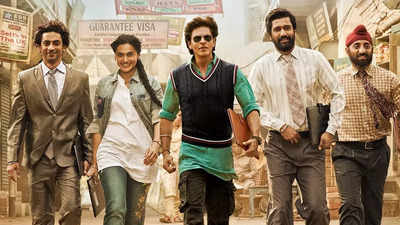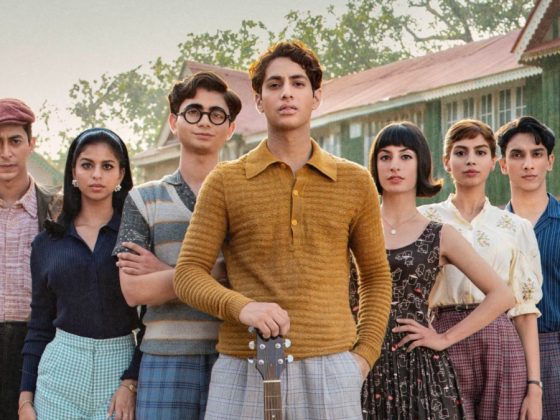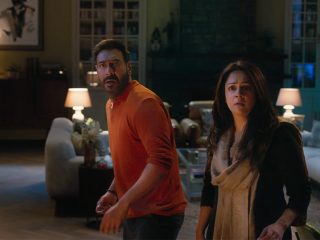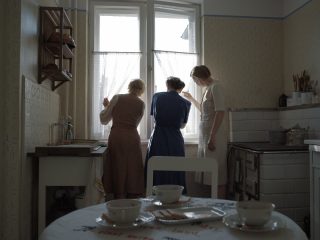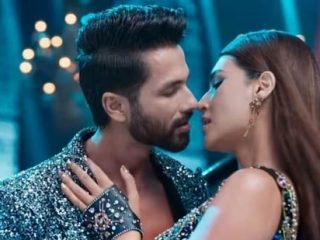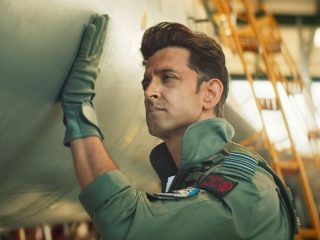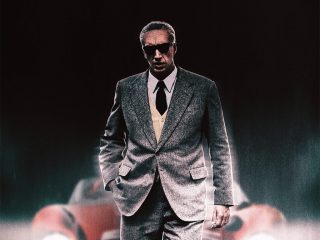After delivering two blockbusters where we witnessed SRK in a completely new avatar, he is back again in the role of a romantic hero in his King of Romance era. But is it able to cast a similar spell that he once bewitched by wrapping those arms full of warmth? A collaboration between Rajkumar Hirani and SRK was long overdue and something we were all eager to watch on the silver screen. Hirani has definitely set the bar of our expectations high with his early directorial masterpieces like Munna Bhai M.B.B.S. Lage Raho Munna Bhai, 3 Idiots, and even PK. However, Dunki shouldn’t be compared with his other films as it has its own share of follies. But then it takes one through a roller-coaster ride of emotions.
Reminiscent of SRK’s Earlier Roles
In the early sequences of the film, where the main character named Hardy, who has aged with time but is still very young at heart, runs in a race wearing a blue-striped yellow ochre t-shirt, it takes us back to our forever favourite Raj from DDLJ. This scene instantly lights up everyone’s face in the theatre, accompanied by a lot of whistles and cheers for King Khan, who has been reigning in our hearts for over decades now. “Mein Dil o ka Baadshah hu,” also gently reminds us how, along with our favourite superstar, we too have aged and evolved with time.
Plot Summary
The plot revolves around a small fictional village in Laltu, Punjab, whose inhabitants are desperate to go to London in search of a better future. Manu, Buggu, and Balli are three friends living in Laltu who are weary of the drudgery and problems of their everyday lives. They therefore dream of settling down in London, aspiring to become financially solvent. Poverty was common among the residents of Laltu, which acted as the driving force behind their desperation to acquire a visa for London. The three friends were struggling, searching for ways to fulfil their dream, until the entry of Hardayal Singh Dhillon, aka Hardy, a soldier who landed in Laltu to express his gratitude towards Manu’s brother, who saved his life when he met with an accident. Hardy comes across the group of three friends and gradually finds a home in them.
With the implementation of the Immigration Reform and Control Act in the UK, people with only proper educational qualifications, especially those who are well versed in English, were allowed visas to enter the country, whereas people who lacked formal education and were devoid of any basic knowledge in English were denied access and therefore availed of the donkey route to the UK. In the wake of such reforms, it was getting difficult for Manu and her two friends to secure a visa, but it was Hardy who enlightened them about the IELTS exam as an easy gateway to getting a visa to London. Four of them together get admission to Geetu Gulati’s English classes to crack the IELTS exam, where they come across Sukhi, who also wanted to visit London in order to reunite with the love of his life, who was married off to a rich guy based in London and was now a victim of domestic violence. The first half of Dunki is brilliantly crafted, replete with humorous sequences that can leave one teary-eyed, making their stomachs hurt out of laughter until the results of the IELTS exams are out and a tragedy befalls Sukhi, who had meanwhile become an integral part of Hardy’s family, which he found in Laltu.
The second half of the film is the complete antithesis of the first. It’s here where Hardy, Manu, Buggu, and Balli – after failing the IELTS exam – embark on the journey to reach London via the donkey route. The storytelling tries to inject hard-hitting emotions, portraying the immense hardships they had to undergo in order to reach their destination. However, their whole world falls apart when they discover a completely different version of London opposed to the kind they had dreamt about. The reality of the illegal immigrants becomes glaringly distressing. Due to circumstantial adversities, Hardy and Manu part ways, but it’s only twenty-five years later when they again reunite in Dubai. This is the part that again echoes Veer and Zara’s reunion. Hardy once again, through the donkey route, brings Manu, Buggu, and Balli forever back to their home country, i.e., India. Hirani, through wry humour laced with emotions, tried to highlight the baselessness of such stringent rules that divide the world, the brutish laws that discriminate between people and prefer to bask in hierarchy rather than humanity. The film makes us question our decisions to leave our country in the quest for a better future, showing how the future is unsure, especially when one is trying to settle down in a foreign land.
The Major Drawbacks
Though the main plot of the film focuses on the atrocities people had to undergo if they weren’t eligible to have a visa to travel to western countries, a love story runs parallel to the main plot, the love story of Hardy and Manu, which, unlike other love stories of SRK’s career so far, doesn’t have that spark even though it used the Veer Zara trope of an unwavering lover who selflessly waits for his lover across two and a half decades to get back together. The writing lacks the ability to conjoin the two halves of the film together. While in the first half a sense of empathy and sympathy is evoked for the misery of the characters, in the second half, even though there are a lot of deeply moving scenes, that emotional connection somehow is missing; the emotions are rather forced. Our eyes don’t get soaked in tears from witnessing Hardy’s emotional torment.
The second half contradicts the first half of the film, where the journey through the donkey route is beset with perils, whereas in the second half everything runs according to Hardy’s master plan and gets successfully accomplished, which seemed strange and felt as if the narrative is in a rush to reach its end. Unlike the music and background score of Raju Hirani films, which usually happen to be timeless and splendid, the music by Pritam doesn’t strike a chord and will definitely be forgotten in due time. The casting of Taapsee Pannu to play the leading role opposite Shah Rukh Khan is something that isn’t unfortunately pleasing to the eyes, and this may be precisely one of the reasons behind their lack of onscreen chemistry throughout the film. Boman Irani as Geetu Gulati isn’t put to proper use and should have definitely been given more screen space, whereas the casting of any other matured actress opposite Shah would have made a much better pair.
Why should one still watch Dunki?
There are precisely two reasons to watch Dunki – first one being the amazing extended cameo that Vicky Kaushal plays in the character of Sukhi. A pensive man with an absolutely shocking and tragic character arc, Kaushal as usual manages to leave an impact in the role delivering a top- notch performance. The second reason, you guessed it right, is once again SRK. It is really a wonder as to how a man of his age can do justice to such a diverse genre of characters in a single year. A man who doesn’t age and whom we never want to age, his screen presence exudes his dedication and hard work towards his craft, increasing our love and respect for him by two-fold every time we watch him onscreen.
In Dunki, we see SRK back in his soft boy romantic era, and it’s absolutely nostalgic, taking us on a roller-coaster ride of emotions where we witness the evolution of our Rahul, Raj, and Veer through Hardy ageing like fine wine. Shah has become a phenomenal phenomenon, always setting unrealistic standards for a romantic lover, driving us gaga and making us set resolutions to fall in love with only men who at least possess some of the traits we find in the fictional romantic heroes enacted by him. SRK has tried his hands at playing a variety of characters across decades, but his exclusivity lies in playing the role of a romantic hero. In Dunki, after years, we get to see SRK in the same avatar that he has redefined in his own style and which now defines a part of him.
Rajkumar Hirani’s latest deals with a very important issue and the sort of theme that no one seemed to ever properly discuss. However, it lacks Hirani’s typical finesse despite the broader scope of the story, therefore leading to a half-hearted execution. Thanks to a familiar template that’s clearly always worked and a stellar cast, the film still manages to be a heartwarming watch.

